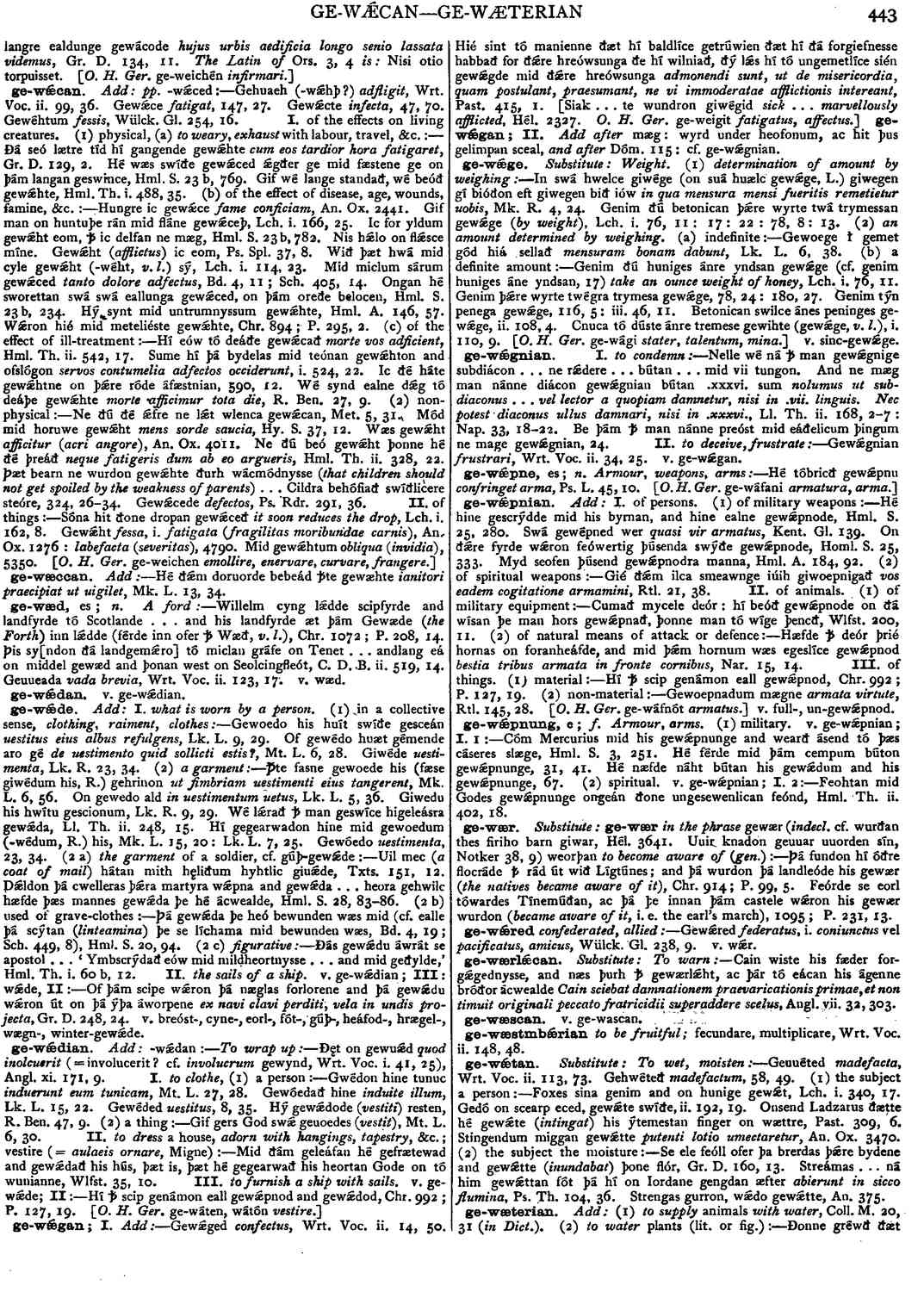ge-wǽcan
-
Gehuaeh (-wǽhþ?)
adfligit,
- Wrt. Voc. ii. 99, 36.
-
Gewǽce
fatigat,
- 147, 27.
-
Gewǽcte
infecta,
- 47, 70.
-
Gewéhtum
fessis,
- Wülck. Gl. 254, 16.
-
Ðá seó lætre tíd hí gangende gewǽhte
cum eos tardior hora fatigaret,
- Gr. D. 129, 2.
-
Hé wæs swíðe gewǽced ǽgðer ge mid fæstene ge on þám langan geswince,
- Hml. S. 23 b, 769.
-
Gif wé lange standað, wé beóð gewǽhte,
- Hml. Th. i. 488, 35.
-
Hungre ic gewǽce
fame conficiam,
- An. Ox. 2441.
-
Gif man on huntuþe rán mid fláne gewǽceþ,
- Lch. i. 166, 25.
-
Ic for yldum gewǽht eom, ꝥ ic delfan ne mæg,
- Hml. S. 23 b, 782.
-
Nis hǽlo on flǽsce míne. Gewǽht (
afflatus
) ic eom,- Ps. Spl. 37, 8.
-
Wið þæt hwá mid cyle gewǽht (-wéht,
v. l.
) sý,- Lch. i. 114, 23.
-
Mid miclum sárum gewǽced
tanto dolore adfectus,
- Bd. 4, 11; Sch. 405, 14.
-
Ongan hé sworettan swá swá eallunga gewǽced, on þám oreðe belocen,
- Hml. S. 23 b, 234.
-
Hý synt mid untrumnyssum gewǽhte,
- Hml. A. 146, 57.
-
Wǽron hié mid meteliéste gewǽhte,
- Chr. 894; P. 295, 2.
-
Hí eów tó deáðe gewǽcað
morte vos adficient,
- Hml. Th. ii. 542, 17.
-
Sume hí þá bydelas mid teónan gewǽhton and ofslógon
servos contumelia adfectos occiderunt,
i.- 524, 22.
-
Ic ðé háte gewǽhtne on þǽre róde áfæstnian,
- 590, 12.
-
Wé synd ealne dǽg tó deáþe gewǽhte
morte afficimur tota die,
- R. Ben. 27, 9.
-
Ne ðú ðé ǽfre ne lǽt wlenca gewǽcan, Met. 5, 31, Mód mid horuwe gewǽht
mens sorde saucia,
- Hy. S. 37, 12.
-
Wæs gewǽht
afficitur (acri angore ),
- An. Ox. 4011.
-
Ne ðú beó gewǽht þonne hé ðé þreáð
neque fatigeris dum ab eo argueris,
- Hml. Th. ii. 328, 22.
-
Þæt bearn ne wurdon gewǽhte ðurh wácmódnysse (
that children should not get spoiled by the weakness of parents
) ... Cildra behófiað swíðlicere steóre,- 324, 26-34.
-
Gewǽcede
defectos,
- Ps. Rdr. 291, 36.
-
Sóna hit ðone dropan gewǽceð
it soon reduces the drop,
- Lch. i. 162, 8.
-
Gewǽht
fessa, i. fatigata (fragilitas moribundae carnis), An. Ox. 1276: labefacta (severitas ),
4790. -
Mid gewǽhtum
obliqua (invidia ),
5350.
Bosworth, Joseph. “ge-wǽcan.” In An Anglo-Saxon Dictionary Online, edited by Thomas Northcote Toller, Christ Sean, and Ondřej Tichy. Prague: Faculty of Arts, Charles University, 2014. https://bosworthtoller.com/50355.
Checked: 0